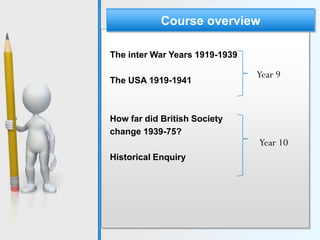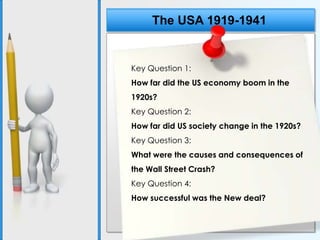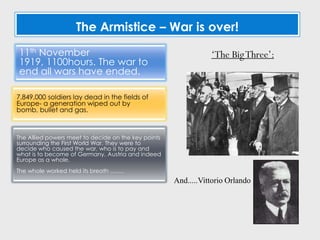Introduction gcse history lesson yr11
- 1. GCSE History . Mr S. Davies Year 9 Grades Aug 2012 Numbers Percentage A* 6 30% A 4 20% B 5 25% C 3 15% D 0 0% E 1 5% F 1 5% G 0 0% U 0 0% Which one do you want to be???????
- 2. Ice Breaker We will go around the class and you need to tell the class your name and one thing that is interesting about yourself
- 3. We need to have our own Class rules I want us a as a class to create a set of Classroom rules that will enable us to achieve our potential and achieve A*s at the end of the year What should our rules be? 1. 2. 3. 4. 5.
- 4. What is History all About???? History is like one big investigation!!! You are trying to find out what really happened/who was to blame from all the clues/evidence that has been left behind. http://www.bbc.co.uk/history/interacti ve/games/death_rome/index_embed. shtml
- 5. You have been using History Skills The skills you have been using their to try and piece together the murder mystery are ones that you will use throughout the GCSE History course You will piece together evidence to work out what and why things have happened
- 6. Course overview The inter War Years 1919-1939 Year 9 The USA 1919-1941 How far did British Society change 1939-75? Year 10 Historical Enquiry
- 7. International Relations 1919-1939 TheTreaty of Versailles The League of Nations The Causes ofWorld War II
- 8. YEAR 9 Scheme of assessment Unit A971: Aspects of International Relations, 1919ŌĆō2005 Paper 1 This is worth 45% of your final grade. 2 hour exam paper. The paper is in 2 sections. (1) International relations 1919-39 (2) USA Depth Study Paper 2 This is worth 30% of your final grade. British Depth Study- this is a source based paper. The exam is 90 minutes. Historical This is worth 25 % of your final grade. Enquiry This is a controlled assessment task based on an area of study.
- 9. Term 1 and 2: International Relations 1919-1939 Key Question 1 Were the Peace Treaties of 1919-1923 fair? Key Question 2: To what extent was the league of Nations a success? Key Question 3: Why had international peace collapsed by 1939?
- 10. The USA 1919-1941 Key Question 1: How far did the US economy boom in the 1920s? Key Question 2: How far did US society change in the 1920s? Key Question 3: What were the causes and consequences of the Wall Street Crash? Key Question 4: How successful was the New deal?
- 11. GCSE History Course Outline Topics Year of Exam Key Questions Exam Structure Grade Boundaries 1. Key Question 1: Cartoon Source Section 1: Max mark Year 11: Were the peace treaties Question: = fair? International January 2013 Key Question 2: 1a: 7 marks 1b: 8 marks Relations To what extent was the League of Nations a Knowledge based Section 2: Max mark = 1919-1939 success? Question: Key Question 3: 2A: 4 marks Why had international 2B: 6 marks peace collapsed by 1939 2C: 10 marks Paper 1: Max mark 2. Key Question 1: Source (Written and = How far did the US Cartoon) Based Section: economy boon in the = A* 4a: 6 marks 1920s? =A The USA Key Question 2: 4b: 7 marks =B How far did US society 4c: 7 marks =C 1919-1941 change in the 1920s? Knowledge Based =D Key Question 3: Question: =E What were the causes 5a: 4 marks =F and consequences of the 5b: 6 marks =G wall Street Crash? Key Question 4: =U 5c: 10 marks How successful was the A * = Max mark ŌĆō New Deal? 10% A = MM -20% etc
- 12. Skills needed for GCSE History Grade C Candidates remember, select, and organise historical knowledge with accuracy and relevance. They show understanding of the historical periods, themes and topics studied. They communicate their ideas using historical terminology. They can create structured descriptions and explanations of the main concepts, features and characteristics of the periods. They can explain relevant causes, consequences and changes of events. They evaluate and use a range of sources of information to investigate historical questions, problems or issues, and with some limited guidance, to reach reasoned conclusions. They recognise and comment on how and why events, people and issues have been interpreted and represented in different ways. Grade A Candidates remember, select, and organise detailed historical knowledge effectively and with consistency. They show thorough understanding of the historical periods, themes and topics studied. They communicate their ideas using historical terms accurately and appropriately. They demonstrate their understanding of the past through developed, reasoned and well-substantiated explanations. They can analyse the key concepts, features and characteristics of the periods studied, and the interrelationships between them. They evaluate and use a wide range of sources of information to investigate historical questions, problems or issues and reach reasoned and substantiated conclusions. They recognise and provide reasoned comments on how and why events, people and issues have been interpreted and represented in different ways, and provide a well-developed consideration of their value in relation to their historical context.
- 13. Lesson Objectives Were the Peace Treaties of 1919-1923 fair? Lesson Objectives: 1. To understand the impact World War I had on the world 2. To know what the Paris Peace Conference was and the motives of the ŌĆśBig Three.ŌĆÖ Competency focus: Diversity Teamwork Reasoning
- 14. What do you know about World War I???? ? World War I
- 15. What can you find out about WWI? You are going to be given laptops and you need to find out as much additional information about WWI as possible. Below are some suggestions of the information you should be looking for: Who fought on whose side Who was to blame for it starting Dates it started and ended Key battles Death figures Where did the fighting take place the damage caused to areas How did it end Any other information that is useful
- 16. Add this additional information to your mind map in another colour ? World War I
- 17. How did people feel about World War One in 1919? World War I: 1. Fought between 1914-1919 2. Involved many countries split into two alliance systems: The Triple Alliance (Germany, Austria-Hungary, Italy) and The Triple Entente (Britain, France, Russia) 3. More than 70 million military ŌĆ£In France and Belgium, where most of the war was personnel, including 60 million fought, 300,000 houses, 6,000 factories, 1,000 miles Europeans, were mobilised in one of the of railway, 2,000 breweries and 112 coal mines were largest wars in history. 4. More than 9 million combatants were destroyedŌĆ”In some ways, mankind has never recovered killed from the horrors of the First World War.ŌĆØ John D. Clare, First World War (1994)
- 18. Aftermath of WWI. Devastation of war The western Front Loss of life. http://www.youtube.c om/watch?v=ZVDUXP B_sTs
- 19. Impact of War Cost of Deaths war Germany France Britain USA
- 20. How much did the War cost? Country Cost in US Dollars Germany 38,451,324,112 Russia 22,905,044,958 France 24,380,876,016 Austria-Hungary 21,262,121,854 British Empire 35,109,719,348 Italy 11,689,018,236 United States 22,768,274,986
- 21. How many soldiers died? 2,000,000 Number of Soldiers Killed in WW1 1,800,000 1,600,000 1,400,000 1,200,000 1,000,000 Killed 800,000 600,000 400,000 200,000 0 Germany Austria-Hungary Britain France Russia USA http://www.youtube.com/watch?v=XJ b-rF9k33g
- 22. The Peace Conference http://www.youtube.com/watch?v=14 zM9DBHuhE&feature=related The Paris Peace Conference Quiz: What was the name of the city and palace where the peace conference was held? When was the conference held? How many nations attended altogether? Give 2 of George ClemenceauŌĆÖs aims? Give 2 of Woodrow WilsonŌĆÖs aims? Give 2 of David Lloyd GeorgeŌĆÖs aims?
- 23. The Armistice ŌĆō War is over! 11th November ŌĆśThe Big ThreeŌĆÖ: 1919, 1100hours. The war to end all wars have ended. 7,849,000 soldiers lay dead in the fields of Europe- a generation wiped out by bomb, bullet and gas. The Allied powers meet to decide on the key points surrounding the First World War. They were to decide who caused the war, who is to pay and what is to become of Germany, Austria and indeed Europe as a whole. The whole worked held its breath ŌĆ”ŌĆ”. And.....Vittorio Orlando
- 24. US President Woodrow Wilson What did America Want? WilsonŌĆÖs 14 Point Programme: 1. 1.There He was bornsecret alliances between countries should be no in 1856 Woodrow Wilson wanted the treaty to be 2. Freedom of wanted a Europe that was saved from war Wilsonon his in peace and war based theUS President in 1912 2. Became seas Fourteen Points but also available to trade with the United States. 3. The reduction of trade barriers among nations 4. The general reduction of armaments Thebelieved Germany well economically out of His character : had done should be punished He U.S. 5. The adjustment of colonial claims in the interest of the inhabitants as theevacuationand sawwanted a just government of any peace but not severely. He trade as a key part war of Russian well as of the colonial powers An idealist and reformer territory and a welcome for its 6. The deal (There are at not leave Germany deal with settlement that would least 4 points that to the society of nations He campaigned against you spot them?). trade -resentful territories in Germany and business feeling can corruption In politics 7. The restoration of Belgian 8.Wilson wanted to set up an international He tried to keep USA French the War including Alsace-Lorraine The evacuation of all out of territory, 9.organisation Italian boundaries along clearly of Nations or claims to ŌĆóThe readjustment ofhecalledtoThe Leaguewould never lines Once war was over wanted national interests Wilson had no ensure that war recognizable coloniesagain. settle disputes which would of nationality happen - he wanted the league to look after them or for them to be self-governed. 10. Independence for various national groups in Austria-Hungary 11. The restoration of the Balkan nations and free access to the a He was a very stubborn character who Did not go back on sea for The AmericanWilsondidGeorgesupport him. However public and not and Clemenceau of ŌĆó Protection for minorities in TurkeyLloydthe free passage of the shipsto compromise Serbia decision, which irritated was prepared They were fed up with involvement in 12. issues andwere morally superiorbecame more Henations through affairs. Theto get the points all felt that the US Dardanelles USA To the European powers. European the League of Poland, includingagreed to. 13. Independence for Nations access to the sea isolationist. 14. A league of nations to protect "mutual guarantees of political independence and territorial integrity to great and small nations alike."
- 25. British Prime Minister David Lloyd George Born in 1863 However, Became Prime Minister in 1916 Lloyd George had just won an election promising to squeeze the pips out of Germany and the people in Great Britain wanted to see the German Character: Head of State (the Kaiser) hung for starting the war. Mainrealist to take to the treaty: A issues ŌĆó He disagreed with politicianof WilsonŌĆÖs fourteen points as Britain who An experienced point two had always had a strong navy felt Britain and her Empire needed to have some controlthere would have to be He knew of the seas. compromise ŌĆó Lloyd George felt that the British should be given GermanyŌĆÖs colonies and the Turkish Germany to becaptured and He wanted territories it had punished ŌĆó Lloyd George did want to see Germanynot have their power limited but he did weakened in some way through itŌĆÖswant Germany to seek revenge in the forces future
- 26. French Prime Minister Georges Clemenceau Main issues to take to the Treaty: Born in 1841 He was Prime minister in 1906-1909 and ŌĆó Clemenceau wanted French troops on was very critical of the leaders of France the Rhineland guarding against any during the war. future German to lead France through He was re-elected attack. ŌĆó Clemenceau war the last year of the wanted Alsace-Lorraine back from Germany - they captured it Character: in the war ofpolitician A hard, tough 1870. ŌĆó Clemenceau wanted Germany to pay Uncompromising forHe had seen his country the war cost - this everything that invaded by would crippleduring his life time (1870 Germany twice Germany and make France more 1914) and powerful in Europe. He was determined to stop this from happening ever again
- 27. The Paris Peace Conference You are going to become one of ŌĆśThe Big ThreeŌĆÖ and are going to make the ŌĆśtoughŌĆÖ decisions that needed to be made in 1919. You need to use the information that you have written down about your character (Personality, suffering in war, pressure from home etc) to decide what decision your character would be likely to take. You will need to discuss the decisions as a table and justify why you make each decision and not another one
- 29. Additional Activity Which issue/decision do you think that your character would be most stubborn with and why? (which was most important to your character)
- 30. Plenary Return to your original mind map that you filled in earlier and in a different colour pen you need to add what you know about World War I and The Treaty of Versailles.
- 31. Rules 1. There is to be shouting or raised voices of any kind- a diplomat does not raise their voice to answer a question or attack an opinion. 2. Remain seated. 3. no conferring with other tables as to their responses and answers. 4. if you need to speak to the teacher raise your hand. 5. you must remain in character- only follow what your character would have done- not what you think you should do. 6. Be careful to make sure everyone has their say.
- 32. The Treaty of Versailles You make the decisions. 30 minutes
- 33. The treaty of Versailles Decisions.
- 34. Plenary

































